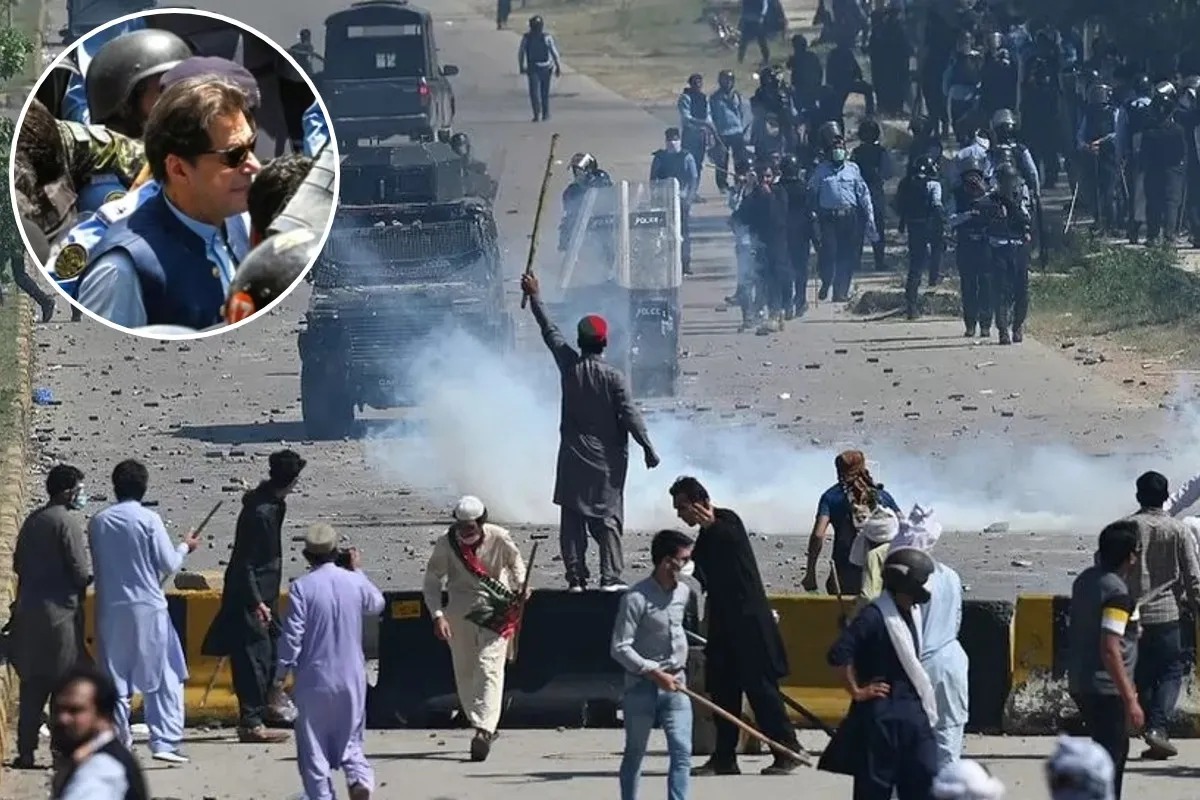
Our neighbor, Pakistan, never ceases to stun the world with new lows in politics. However, the drama that unfolded this week in the country’s political arena is unprecedented, even by its own standards. Witnessing a former Prime Minister being almost dragged by the security forces – the para-military Rangers in this case – in broad daylight and that too in the court’s premises is not something one gets to see every day.
Imran Khan’s arrest may have been ordered by Pakistan’s controversial anti-corruption agency, the National Accountability Bureau (NAB), but the manner in which the order was carried out has few parallels, even under totalitarian regimes. Not that the world had high expectations from Pakistan’s polity, which has a long history of even worse forms of vendetta, but the reaction of Imran Khan’s party workers to the arrest made South Asia watchers take notice all across the globe. Who could have imagined the almighty Pakistani Army facing a violent backlash from the mob in such a manner? Many believe that the anger against the army is no longer restricted to Pakistan Tehreek-e-Insaf (PTI) and that the beleaguered party has the support of the common masses. Interestingly, the country’s Apex Court also sided with the PTI Chairman and declared the arrest illegal. His release was imminent at the time of publishing this article.
Temporary legal respites apart, Imran Khan’s legal troubles seem far from over. He is currently facing 76 different cases. Charges have already been framed in the Toshkhana case involving the alleged appropriation of state gifts he received as the Prime Minister. While it is difficult to speculate if and when Khan will again be behind bars, any such development will most certainly brook even more devastation for the economically beleaguered country. It has already lost more than 19 lives and suffered damages worth billions of rupees in two-day-long protests after the arrest.
Even greater dangers lie ahead for the country’s fragile democracy. Nobody can predict when Pakistani Generals’ patience will run thin if Imran Khan and his party continue their anti-army tirade. Even the slightest possibility of yet another stint of the army’s takeover will send shockwaves all across the world, needless to say, Delhi included.
The Pakistani Army is no less ruthless than the terror “snakes” it breeds in its backyard. The army’s insatiable lust for political power makes it even more sinister in many ways. It has directly ruled the country for more than three decades – from 1958 to 1971, 1977 to 1988, and then under General Pervez Musharraf from 1999 to 2008. The army’s shadow loomed large over the civilian governments for the rest of the period. No matter who is in power in Islamabad, everybody knows that Rawalpindi’s General Headquarters (GHQ) is calling the shots when it comes to Pakistan’s nuclear and defense policy or its foreign relations, especially with India, China, the US, and Afghanistan. What better predicament to summarize this bitter reality than the fact that none of Pakistan’s 22 elected Prime Ministers have completed their full term in office.
Pakistan’s generals have a long history of betraying their elected leaders. The current Prime Minister Shehbaz Sharif’s brother and three-time Prime Minister Nawaz Sharif was deposed by his own appointee Pervez Musharraf in 1999. History repeated itself with him more than one-and-a-half decades later, and this time even more cunningly. His choice for the Army Chief’s post in 2016, General Qamar Javed Bajwa, proved smarter than General Musharraf. Instead of directly taking the blame for overthrowing a democratically elected government, General Bajwa created circumstances that culminated in Nawaz Sharif’s exile. Zulfikar Bhutto paid with his life for appointing General Zia-ul-Haq as the top Army Commander in 1976. Bhutto was walking down the gallows within a year of taking this decision.
In this context, the wind seems to be blowing in the opposite direction for the Pakistani Army for the first time in its history. Imran Khan and his party have equally targeted the army leadership for his ouster from power, as the opposition parties. In fact, Khan has gone a step ahead by accusing and even naming the ISI officers for two attempts on his life in the past six months. It might amuse readers to know that the present Army Chief General Munir and his predecessor General Bajwa were held responsible by many analysts for engineering Imran Khan’s ascension to power in the first place.
It will be interesting to see how long the current PM will continue to enjoy the current Army leadership’s support. Weak as he may seem to be, the country has few options other than the current PM Shehbaz Sharif to place its bets on, at a time when its economy is on the verge of collapse.
The Pakistani nation is at a juncture where it is at war with itself. While the Army leadership and the ruling coalition have dug their heels on one side, Imran Khan is not the one to blink first, especially with the judiciary backing him. Both sides are prioritizing settling scores over fixing the country’s humongous problems. The unwritten social contract that mandated the army’s superiority over the civilian government is now defunct, and the army lacks the credibility to regain this pre-eminence in public perception anytime soon.
This could lead to a new beginning in Pakistan’s democracy, but much will depend on how the main players in this power game will play their cards. For now, several questions loom large over its future. What will be the ultimate conclusion of the ongoing unrest? To what extent will the judiciary stand with Khan? Is Khan headed for a similar fate as Nawaz Sharif? Can PTI throw Imran’s replacement? With the TTP’s terror knocking at its doors yet again and the country’s economy running out of steam, Pakistan does not have much time to find answers to these questions.
How should India react to these developments? One thing is clear from the recent developments- Pakistan Army no longer enjoys the same clout. Few could have imagined such a situation some years ago. This means Imran Khan’s arrest is not likely to solve all of the Pakistan Army’s problems and indeed of its current Chief General Munir. Pakistani politics will most likely continue to drift aimlessly in the near future.
All this does not bode well for India. Such chaos will only strengthen anti-India elements in Pakistan. One signal of this was preposterous claims by Shehbaz Sharif’s aide Atta Tarar blaming BJP and RSS for the ongoing turmoil. While this vitriol is unlikely to cut any ice in global forums, it could manifest in heightened tensions along the borders, especially in Kashmir.
Islamabad has sought to move closer to China after the US withdrawal from Afghanistan. The present crisis could push it further towards the dragon. This is certainly not good news for India. New Delhi needs to respond cautiously to any peace overture from Pakistan under such circumstances.


















